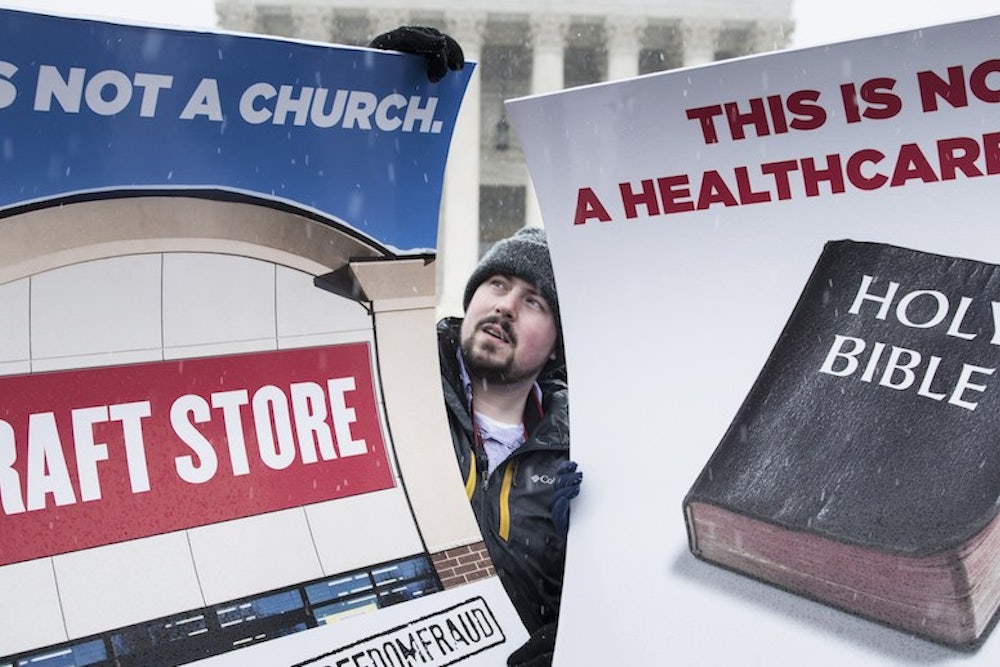On Monday, the Supreme Court will decide one of the most controversial cases in recent memory, Burwell v. Hobby Lobby, which asks whether religious employers must offer contraceptive coverage to employees. But regardless of the verdict, the GOP’s scorched-earth attack of the Affordable Care Act has already claimed its primary victim: religious freedom.
The Hobby Lobby blockbuster has been decades in the making. In fact, it has its origins in another landmark Supreme Court decision from a quarter century ago, Employment Division v. Smith. In Smith, the Supreme Court was asked whether the First Amendment’s protection of religious freedom shielded Native American worshippers who used peyote in religious ceremonies from enforcement of anti-drug laws. The Court’s decision in 1990, written by Justice Antonin Scalia, landed like a thunderclap. The Court ruled against the worshippers, and Justice Scalia wrote that religious people had no presumptive exemption from general laws, no matter how minor or unimportant. As long as the law wasn’t specifically directed against a religious group—as long as the law was “neutral and generally applicable”—the Constitution offered the pious no protection. If the law prohibited wine, then sacrament would be forbidden; and if a courthouse demanded bare heads, then Jewish petitioners would have to remove their skullcaps.
The sweeping decision outraged the entire political spectrum, and the public outcry led to swift legislative action. If the Constitution didn’t sufficiently protect religious freedom, then Congress and the state legislatures would do so. In the coming years, the federal government and most states passed variations on the Religious Freedom Restoration Act. These new laws acted as a “legislative fix” to the Supreme Court’s decision. Under the RFRAs, laws and regulations would be closely scrutinized by the courts whenever they burdened religious freedom. Now, only if a government mandate was particularly necessary would it trump sincere religious objections. Laws against human sacrifice would always apply, no matter how religiously central the practice; but a sincere Jehovah’s witness would not be compelled to assist in the production of weapons.
The remarkable thing about the Smith decision’s aftermath was the overwhelming consensus. Nearly everyone agreed that the Court’s result was morally unacceptable and needed to be changed. The Federal RFRA gained the backing of everyone from the ACLU to the Traditional Values Coalition, and it passed unanimously in the House and with 97 votes in the Senate. There was no Right and Left on this issue, just widespread agreement: the state ought to burden religious practice only when absolutely necessary.
But in the last two years, a matter of consensus has become a partisan wedge issue. And that’s largely due to the enlisting of RFRA in the GOP’s unceasing attack on President Barack Obama and his signature achievement, the Affordable Healthcare Act.
Now, despite the statements of some liberal commentators, plaintiffs in Hobby Lobby have a genuine case under RFRA. The case features business-owners who genuinely feel that paying for certain forms of contraception—even indirectly—burdens their religious freedom. Yet according to regulations developed as part of Obamacare, the federal government now mandates that employers cover these forms of contraception. But how necessary is the contraception mandate? And could the federal government ensure contraceptive coverage by other less burdensome means? Those questions certainly seem to raise important RFRA issues. And the related question of how far religious freedom rights carry over to corporations is similarly genuine. (For instance, I certainly hope The New Republic has free-speech rights and the local church has free-exercise rights, even though they are corporations.) But these tough moral and legal questions have taken a backseat in the public debate because almost everyone understands that the bulk of attention, speed, and support for the Hobby Lobby suit is motivated by the GOP’s ongoing attempt to hurt the president and pick apart the AHA.
But as conservative media seized on religious freedom suits like Hobby Lobby to bludgeon Obama, the left has increasingly abandoned RFRA. Where liberals once championed a law meant to protect small religious groups from callous majorities, they now see an endless slippery slope of religious conservatives obeying whatever laws they happen to find acceptable. In religious freedom, the left now sees only a shield that will allow religious conservatives to discriminate against gays and harm women’s reproductive health. In the partisan rancor that has consumed today’s Washington, the consensus in favor of religious accommodations has been shattered.
But for those of us who care about religious freedom, the social consensus is far more important than the particular outcome of Monday’s decision. And that’s because the majority of religious accommodations are made on the local level of day-to-day human interaction, not under the threat of court order. It is the Veterans Affairs hospital bureaucrat who understands why the Jewish doctor must leave early on Fridays that truly matters, not the Justice who sits enthroned in her chambers. As the debate around Hobby Lobby becomes so poisonous and so politicized, it is the bureaucrat who grows less sympathetic, and it is the doctor who will suffer.
For me, this issue is personal. That VA doctor is my father. If not for the professors who rescheduled my Saturday exams and the university administrators who ensured the presence of kosher food on campus, I could never have graduated college. I will always be grateful to these men and women, but I do not feel that they were doing me a favor. I was morally entitled to the accommodations they provided, and much of the reason I feel so grateful is that these officials believed in that entitlement just as much as I did. They were part of that old RFRA consensus; they viewed religious accommodations not as a privilege, but as a responsibility.
But now that consensus is unraveling, and no matter Monday’s verdict, Hobby Lobby represents its ultimate fracture.
